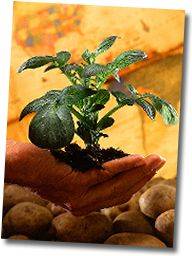|



| |
Natural pesticidal products, also called botanical pesticides,
are available as alternatives to synthetic chemical formulations. Although
thought of by some as "natural," and therefore assumed to be harmless,
safety clothing must be worn when spraying these, even though their toxicity is
low to warm-blooded animals. Some botanical pesticides are toxic to fish and
other cold-blooded creatures and should be treated with care.
The botanical insecticides break down readily in soil and are
not stored in plant or animal tissue. Often their effects are not as
long-lasting as those of synthetic pesticides.
Appropriate Insecticide Use
|
INSECTICIDE
|
USE AGAINST
|
Pyrethrum
|
pickleworms, aphids, leafhoppers, spider
mites, harlequin bugs, cabbageworms, Mexican bean beetles, flea beetles,
flies, squash bugs
|
Rotenone
|
Colorado potato beetle, Mexican bean
beetle, Japanese beetle, flea beetles, fleas, cucumber beetles,
spittlebugs, aphids, potato beetles, mites, carpenter ants, cabbage
worms, loopers
|
Ryania
|
codling moths, corn earworm, oriental
fruit moth, potato aphids, onion, thrips, corn earworms
|
Sabadilla
|
armyworms, harlequin bugs, stink bugs,
cucumber beetles, leafhoppers, cabbage loopers, blister beetles
| | | | |
In addition to botanical insecticides, other biological
products can help in the battle against insects. However, some of these
compounds may be difficult to find.
Bacillus thuringiensis (B.t.) is an effective product commonly
used against moth larvae. B.t. is a bacteria that produces a toxin quite lethal
to caterpillars, but nontoxic to beneficial insects and mammals. B.t. is most
effective on young larvae. New strains of B.t. have been developed to work
against other types of insect larvae.
Another biocontrol product available to gardeners is
grasshopper spore. It is not proven for small-scale use, but may help gardeners
reduce damage by grasshoppers.
Commercial insecticidal soap, a special formulation of fatty
acids, has proved effective against aphids, leafhoppers, mealybugs, mites, pear
psylla, thrips and whiteflies. Homemade, soap sprays also work to some extent.
They can be formulated by combining three tablespoons of soap flakes (not
detergent) per gallon of water. Spray on plants till dripping.
Repellent sprays, such as garlic sprays and bug sprays (made
from a puree of bugs), have been reported as useful by some gardeners, but their
effectiveness is questionable. Some researchers believe that bug sprays may work
if a disease is present in the insect macerated and that disease is spread
through the spray to other insects.
Apply all insecticides locally, to take care of a specific
pest problem, instead of blanketing the entire garden. Call your local Extension
office for specific recommendations.
|
![]() Gardeners' Corner
Kids'
Garden
Sustainable Garden
Contact Us
Gardeners' Corner
Kids'
Garden
Sustainable Garden
Contact Us![]()

